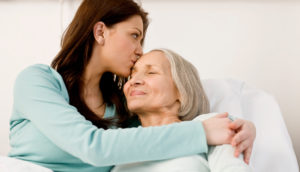 Maybe you’ve been caring for a loved one with Alzheimer’s or you work in an assisted living community for a while. You know how to listen to them, to read them if they’ve trouble communicating, and to be patient if they repeat the same stories or get confused.
Maybe you’ve been caring for a loved one with Alzheimer’s or you work in an assisted living community for a while. You know how to listen to them, to read them if they’ve trouble communicating, and to be patient if they repeat the same stories or get confused.
If you’re used to dementia care, memory care or Alzheimer’s care, you might know exactly what you’re doing already… but of course, we can always afford to learn more. As human beings, and especially as those in care of our fellow human beings. So this post includes a few hints that might help you on your caring journey.
On the other hand, maybe you’re new to the world of caregiving. Maybe your loved one has only recently been diagnosed with Alzheimer’s, Dementia or another form of memory loss – which can be an extremely emotional and testing time for everyone involved. So this post is also for you – offering key advice to help you at this early stage of your caregiving journey.
5 tips to help you as a caregiver or in assisted living:
Look after yourself
This is one of the most important tips we have to offer – because it’s often the one that caregivers forget. They’re so busy looking after someone else that they become overwhelmed, exhausted and highly stressed, which can result in what’s known as “caregiver burnout”.
They don’t find the time to exercise, to sleep properly or to eat well. Sometimes they even neglect to get their own health seen to. Then there’s the emotional stress involved in watching someone they love change before their eyes.
Complete responsibility can be a heavy thing to bear. And sometimes the healer needs healing, too. The carer needs to be cared for.
So remember to take some time out for yourself – whether it’s a jog or a yoga class in the mornings, a bath in the evenings or an afternoon at the cinema. Time where you can relax and just focus on your own needs for a change.
We’d highly recommend learning how to recognize/manage stress, too. For instance, meditation has been proven to reduce stress and anxiety, plus any of the physical repercussions of too much stress in your life. Even 5–10 minutes a day of sitting somewhere quiet and focusing on your breath, in and out of your body, can work wonders… it’ll even help you sleep better at night!
Yoga is another way to look after yourself, physically and mentally, while getting your daily dose of exercise in.
Of course, there are plenty of ways in which you can focus on your own health. And it’s important you take active measures to do so. Because only then will you be in the best condition possible – able to provide that exceptional care, that special attention, to your loved one.
Try not to take things personally
As their condition deteriorates, the person in your care might struggle with communication. They might find it hard to express themselves in words – so their emotions might be all that comes out. This breakdown in communication can cause caregivers to feel anxious, irritated and helpless. A feeling that might worsen if your loved one suddenly turns to fits of rage, using offensive language and directing what seems like a personal attack at you, the person looking after them.
Take a step back, and take a deep breath. Try not to be personally offended if your loved one becomes paranoid or accusatory… or if they don’t remember you and lash out. It’s not directed at you, it is the nature of the illness.
Once you can be strong in yourself and know that it’s not personal, then you can start to handle the situation. Ignore offensive language and redirect their attention to another topic when possible. You can begin to calm them down simply by speaking in a normal tone and a normal volume, and avoiding negative statements if possible. Your positive attitude will reflect on them.
Also, by encouraging your loved one to express themselves in different ways – like through music, or painting, or writing – you can start to show them a world that doesn’t revolve around speaking.
Keep things simple
Often those with Alzheimer’s, Dementia and other forms of memory loss can become more agitated or afraid when they don’t understand what’s happening. When someone new arrives. When instructions are too complicated. Or when there’s a break in routine and they don’t know why.
So as best as you can, make your conversations nice and simple. Ask one question at a time if or give one instruction at a time (for instance, if your loved one is relearning certain activities of daily living).
Remember, no matter how hard a time this is for you, it’s a whole different ball game for them. They might be feeling all kinds of fear, frustration and anger, even if they don’t show it on the surface. So do whatever you can to make things easier (obviously, while still living your life, too). If their routine needs to change a little one day (because hey, life happens), simply explain what’s going on. In a calm voice, with no room for confusion, making it easier for everyone involved.
Seek outside help
You don’t need to do this alone. Because, while the role of caregiver doesn’t come with an instruction manual, there are plenty of books, online training resources and support groups out there. You can learn the key skills involved in being a caregiver, how to monitor symptoms and behavioral changes and benefit from the support of people who know what it’s like.
Link in with an Alzheimer’s association in Chandler or other networks in your area and bring your questions/concerns to them. In the meantime, enjoy the support of other family members, colleagues and friends. If they’ve offered to help, don’t refuse it. If they haven’t, don’t be afraid to ask.
Find some joy
The business of caregiving can be an exhausting and an emotional one. And often way too serious. While we don’t want to make light of your situation in any way, we also believe that it’s so important – for you and your loved one – to find joy whenever you can.
Have fun doing activities together – watching a funny movie, or dancing, or doing a puzzle. Do things that make both of you happy, enjoy this quality time and get out in nature as much as possible. It’s hard to be down when you see all the little miracles around you.
You’ll do just fine!
As long as you’re helping your loved one to live with dignity and respect, expressing their individuality when possible, you’re doing a great job. It won’t always be easy. And we all make mistakes.
But remember, your caregiving is making the biggest difference to your loved one’s quality of life. It’s an incredible gift, and one you should be very proud of.












